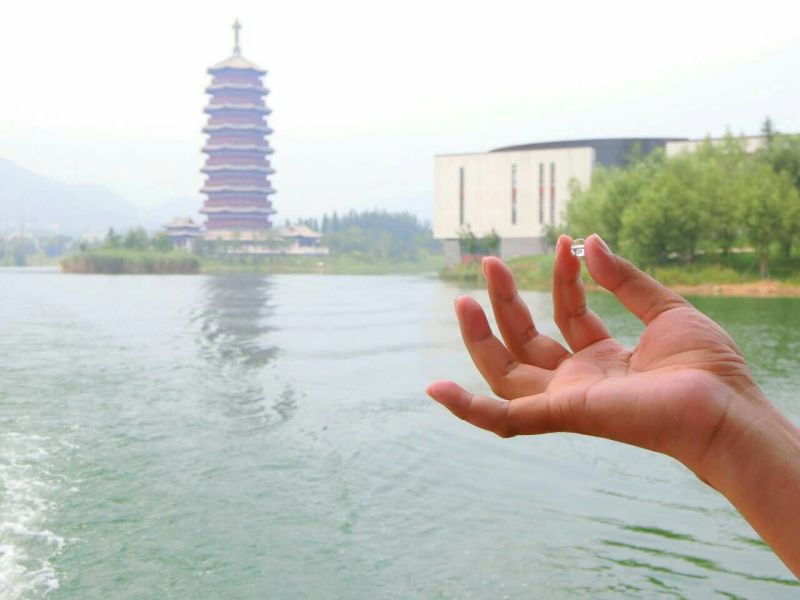Zen’s Voyage from India to China

Zen’s Voyage from India to China
Jan /7/ 2023 – Jan / 8/ 2023
Hello everyone, welcome to our Dharma talk at Dharma Rain Meditation Center.
As we all known, Buddha started his Dharma teaching since 2500 year ago, the Flower Sermon is about his student whose name is Maha Kasyapa got the special transmission outside of the scripture from the Buddha Sakyamuni. After Buddha’s nirvana, his Arhat disciples gathered in a Cave that only Arhat can enter recited Buddha’s teaching and wrote them down, which created the oriental Buddhism transcriptions.
Around 500 AD, the Zen transmission has been passed on 28th generation. The descendant of this generation is also a prince whose name was Bodhidharma. He was the third son of Nontazu King, most loved by his father who wanted to pass on the throne to him. However, instead of the throne and palace, Bodhidharma was more interested in the Dharma cultivation; therefore, he followed the famous Buddhism Master Prajnatara when he was very young and became a monk. Before the nirvana, Master Prajnatara passed on the symbolic robe and bowl of dharma succession to Bodhidharma and asked him to go to China to spread the Dharma. Therefore, Bodhidharma undertook a long voyage to China, became the well-known first Patriarch of Zen.
When he arrived Guangzhou, Bodhidharma was introduced to the emperor Wu of China, who was a Buddhist himself. In the meeting with emperor Wu, Bodhidharma exhibited the sort of sharp, shocking teaching skills that would become characteristic of Zen Buddhist masters. This meeting is regarded as China’s first introduction to Zen Buddhism.
The emperor practised the outward behaviours of Buddhism; he wore Buddhist robes, abstained from eating meat, built hundreds of temples and supported thousands of monks and nuns. The emperor was proud of his knowledge of Buddhism and his support of Buddhism in his kingdom.
He asked Bodhidharma: “Since I came to the throne, I have built many temples, published numerous scriptures and supported countless monks and nuns. How great is the merit in all these?”
“No merit to speak of.” was the shocking reply of Bodhidharma, the emperor had often heard renowned masters say, “Do good, and you will receive good; do bad and you will receive bad. The Law of Cause and Effect is unchangeable; effects follow causes as shadows follow figures.”
But now, this foreign sage declared that all his efforts had earned no merit at all. The emperor failed to understand that one is not practising Buddhism if one does good with the desire to gain merit for oneself. It will be more like promoting one’s own welfare or hoping for admiration by the public, so he asked why, Bodhidharma answered: “This is a cause that made you go to heaven, it will follow you however it is not real.”
“Then what is real merit?” The emperor asked. “It is pure wisdom and perfect, it is originally from Dharmata (self-nature), it is empty and independent, it is such merit that you could not seek from the outside world.”
The emperor still confused: “What then, is the essence of Buddhism?” Bodhidharma’s immediate reply was “Vast emptiness and no essence at all!” This stunned the emperor. Other masters had explained that the essence was contained in doctrines such as The Four Noble Truths and the Dharma of Cause and Effect, but this foreign sage of Buddhism had just declared there was ‘no essence at all’.
Then the emperor asked the last question desperately, “Who am I talking to?” Bodhidharma knew that the emperor Wu was still struggling about the phenomenon, so he answered him as “I do not know”, which, made emperor Wu feel more disappointed and Bodhidharma felt it is not the time of spreading Buddha’s Dharma, so he left and went to the Shaolin Temple. In the Shaolin temple, he lived in a nearby cave, where he faced a wall for nine years, not speaking, eating or drinking for the entire time, people call it Nine years of wall-gazing.
So, this is the story of Bodhidharma, tell me, what are you thinking about now? Do you feel there are something similar between the Zen stories? Between Bodhidharma and Maha Kappasa? But you can not tell exactly how or why. Do not ignore this feeling; it is an important part of Zen cultivation as the significant feature of Zen is not to rely on the speech; everything goes to heart and self-nature.
OK, let’s continue, to see what happened after Nine years of wall-gazing, when Bodhidharma left his cave.
A young monk Shenguang went to Bodhidharma wanted to follow him as a student and cultivate Buddha’s Dharma. Shenguang was a famous scholar before he became a monk, after reading some Buddhist classics, he found the teaching of Confucius was just etiquette rules and Lao Tseu’s theory was not as insightful as Buddhist classics therefore he chose to become a monk and started his Dharma cultivation. When he met Bodhidharma, Shenguang was impressive by Bodhidharma’s wisdom; he wanted to follow Bodhidharma and become his student, Bodhidharma initially refused to teach him when he came. However, Shenguang never gave up; he just followed Bodhidharma and severed him as a student for four years. One day, it was snowing badly, Shenguang stood in the snow outside Bodhidharma’s cave all night like he always did, the snow reached his waist and made him like a snowman, Bodhidharma woke up and asked Huike that why he was there, Shenguang replied: “Master, please show your mercy that to open the gate of the elixir or universal compassion to liberate all beings, please teach me Dharma”.
Bodhidharma refused him again by saying “Buddha’s teaching is such magnificent being in the universe, how can you hope for the teaching with your very limited virtue, little wisdom, a shallow heart and arrogant mind? It will just be a waste of effort; you won’t understand it.””You could be my student if red snowflakes drop from the sky” Bodhidharma added.
Shenguang realized that he needs to prove his resolve, so he cut off his left arm and presented it to the Bodhidharma as a token of his sincerity at which point Bodhidharma accepted him as a student, gave him a new name as “Huike” and started to teach him Buddha’s Dharma.
After offering his arm, Huike felt unbearable pain, so he asked the Bodhidharma: “Master, my mind is anxious, could you please pacify it?”
Bodhidharma replied: “Bring me your mind, and I will pacify it.”
Huike said: “Although I’ve sought it, I cannot find it.”
“There”, Bodhidharma replied, “I have pacified your mind.”
According to the conversation above, a conversation seems not very logical, Huike suddenly understood that our mind is everywhere; however, not real, all that we are struggling with is nothing but our delusion.
As each day passed, Bodhidharma realized that it is the time to pass on the symbolic robe and bowl of dharma succession to one of his student and return to India so he called together his disciples and asked: “Can each of you say something to demonstrate your understanding?”
Dao Fu stepped forward and said, “It is not bound by words and phrases, nor is it separate from words and phrases. This is the function of the Tao.”
Bodhidharma: “You have attained my skin.”
Zong Chi stepped up and said, “It is like a glorious glimpse of the realm of Akshobhya Buddha. Seen once, it need not be seen again.”
Bodhidharma; “You have attained my flesh.”
Dao Yu said, “The four elements are all empty. The five skandhas are without actual existence. Not a single dharma can be grasped.”
Bodhidharma: “You have attained my bones.”
Finally, Huike came forth, bowed deeply in silence and stood up straight.
Bodhidharma said, “You have attained my marrow.”
Bodhidharma passed on the symbolic robe and bowl of dharma succession to Huike who is 2nd Patriarch of Zen.
I would like to explain the metaphor here, to tell you what is skin, flesh and bone means, ancient Chinese get used to transforming the level of knowing something into a metaphor for a human body, skin means a superficial understanding, the flesh is better than the skin, bone means an in-depth study and so on.
Must you be thinking about the reason now .why? Why, with just a simple bow, Master could affirm a student, could sense their understanding and achievement of cultivation exactly. Have you felt the beauty of it? In the Zen cultivation, Masters who achieved enlightenment can easily sense your inner world without language; they are the unique being that could affirm your understanding and enlightenment. It sounds similar to the smile sermon, isn’t it? After all, the essence of Zen is not about language and analyses, see the self-nature and understand it is as the same like Buddha’s nature and all being’s nature, the phenomenons are beyond count, but the self-nature is the one. At this point, language becomes necessary; the heart knows everything.
OK, this is how the Dharma voyaged to China from the west and started to spread. I hope you could sense the Zen in this cold winter morning and thank you for the listening!






2 Comments
Cicely
I appreciate the range of topics you explore on your website. There’s always something new to learn.
Eugene
Your website is a great resource for information on these topics.